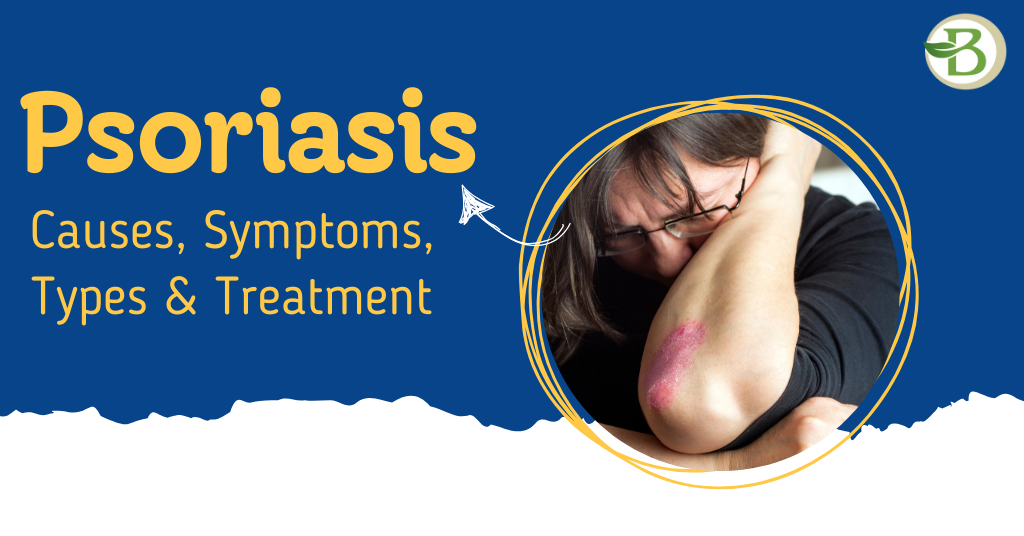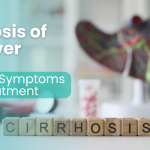Everything you need to know about Psoriasis
Are you seeing red, raised patches of skin with silvery scales or dry, cracked skin that could bleed? It’s important to realise that this might be more than just a simple skin problem. These symptoms could be signs of Psoriasis, a condition that can worsen over time if not appropriately addressed. This blog provides vital insights about this skin problem, allowing you to manage it effectively.
Understanding Psoriasis:
Psoriasis is a chronic autoimmune ailment in which the immune system becomes overactive, leading to the rapid multiplication of skin cells (up to 10 times faster than normal). Skin cells typically develop and shed within a month. However, with psoriasis, the process takes only three or four days. Rather than shedding, skin cells accumulate on the outermost layer of the skin surface. This excessive growth often leads to inflammation, raised plaques, and the presence of scales. On individuals with lighter skin, the affected patches may exhibit a red colouration accompanied by white scales. Conversely, on individuals with darker skin, the patches may appear purplish, violet, or brown, with grey scales. In some instances, these patches may become cracked and prone to bleeding.
Inflammation stemming from this condition can extend its impact to various organs and tissues throughout the body. Individuals dealing with it may also experience what’s known as psoriatic arthritis (PsA), characterised by joint swelling, stiffness, and discomfort. This form of arthritis often goes unnoticed, particularly in its milder forms. Nevertheless, timely intervention is crucial in preventing long-term joint damage.
Causes:
One thing is foolproof: Psoriasis is not communicable. The exact cause of psoriasis is unknown to physicians. However, after years of examination, they have a general understanding of two key factors:
- Immune system– An autoimmune disorder, like psoriasis, arises when the body’s defence mechanism, mainly white blood cells called T cells, mistakenly targets healthy skin cells. Ordinarily, these white blood cells are dispatched to combat invading bacteria and safeguard against infection. However, in the case of psoriasis, this immune system prompts an overproduction of skin cells. As a result, new skin cells proliferate prematurely, accumulating on the skin’s surface.
- Genetics– Some people inherit genes that increase their risk of developing psoriasis. If you have an immediate family member with a skin problem, you are at a higher risk.
Psoriatic outbreaks can also be triggered by the following:
- Skin injuries like cuts, scrapes, insect bites, and severe sunburn
- Weather, particularly cold and dry conditions
- Smoking and breathing secondhand smoke
- Skin infections or Strep throat
- High alcohol consumption
- Specific medications
Signs:
The symptoms of psoriasis differ from person to person and depend on its specific form. It can affect large portions of the body or just a few spots, like your elbows or scalp. Along with these, you may also notice:
- Silvery-white scales covered with redness
- Thick, pitted nails
- Dry skin that may crack and bleed
- Pain around patches
- Itchy sensation and burning feelings around areas
- Joints that hurt and swell (psoriatic arthritis)
The need to scratch itchy psoriatic scales is strong, but resisting the urge is necessary to prevent skin damage and worsening the illness. Pay attention to all your symptoms—not just skin plaques.
Connect with our skin specialist, Dr Mahima, for timely intervention and effective management.
Types:
Plaque Psoriasis: This is the most prevalent kind, also known as psoriasis vulgaris. Thick red or purple areas of skin, frequently accompanied by grey or silvery-white scales, are the defining features of this kind. These patches commonly form on your scalp, lower back, knees, and elbows. While patches typically range in width from 1 to 10 cm, they can also be bigger and cover a broader area of your body. Contact us for plaque psoriasis treatment.
Guttate Psoriasis: This kind of covers the body with tiny, dot-like lesions. These lesions often appear on the scalp, thighs, torso, or upper arms. This form of skin condition typically begins in adolescence or early adulthood. Stress, a skin injury, tonsillitis, strep infection, or certain medications can bring it on. Genetic factors can sometimes be the cause.
Inverse Psoriasis: Individuals with this kind notice shiny, smooth lesions in their body folds. Usually seen in creased parts of the body where skin meets skin, these lesions can be found on the groin, beneath the breasts, behind the knees, under the arms, or close to the buttocks and genitalia. This illness may result in skin sores that get worse if you massage or sweat in the affected region. Yeast accumulation can occasionally cause it. Reach out to us for your inverse psoriasis treatment.
Pustular Psoriasis: The distinctive feature of pustular psoriasis is pus-filled lumps, or pustules, encircled by reddish, swollen, or otherwise discoloured skin. White blood cells are present in these blisters, which are not infectious or communicative. The bumps may cause pain and soreness. Though they can develop anywhere on the body, pustules typically first occur on the hands or feet. Scales or brown spots may remain on the skin after the pustules dry out. Call us now for your pustular psoriasis treatment.
Nail Psoriasis: Nail psoriasis is the term that affects the fingernails or toenails. Nail discolouration, red or white areas beneath the nails, abnormal nail development, pitting (tiny pinprick holes), lifting of the nail away from the skin, and breaking of the nails are some symptoms that can accompany this kind. This form is common in individuals with plaque psoriasis. However, some people may only witness one affected nail. Contact us for your nail psoriasis treatment.
Scalp Psoriasis: Symptoms of scalp psoriasis include patches of scales and itchiness that can sometimes lead to bleeding if scratched. Roughly half of these cases involve the scalp. Initially, these symptoms can be confused with dandruff, a common condition known as seborrheic dermatitis. The effects of scalp conditions may extend beyond the hairline, affecting areas such as the forehead, the back of the neck, and regions around the ears. Reach out to us for a natural scalp psoriasis treatment.
Homeopathic Treatment
Many people consider homeopathic treatment for psoriasis a successful choice because of its unique healing properties. Using very diluted ingredients to trigger the body’s natural healing reaction, homoeopathy, a technique founded on the notion of “like cures like,” promotes long-term healing rather than merely suppressing psoriasis symptoms. Organic ingredients make homeopathic medicine for psoriasis, which has no adverse side effects. Homeopathy, in contrast to traditional medicine, addresses the patient as a whole, considering their particular symptoms, medical background, and mental health. This method has demonstrated encouraging results in controlling psoriasis symptoms and encouraging long-term remission.
It is essential to consult with a qualified healthcare practitioner to determine the most effective course of therapy for each individual.
Bharat Homeopathy
Because of its outstanding reputation, Bharat Homeopathy is the best option for anyone looking for efficient homeopathic therapy for their problems. Our hospital is well known for its ability to treat a wide range of illnesses effectively. Our team of knowledgeable and experienced homeopathic physicians is committed to giving our patients the best possible care. We use a comprehensive and individualised approach to treating psoriasis, considering each patient’s requirements and symptoms. We blend cutting-edge medical research with age-old homoeopathic treatments to provide persistent and beneficial effects for our patients. Put your trust in Bharat Homeopathy for a permanent solution for psoriasis, and see improvements in your overall health and well-being.


